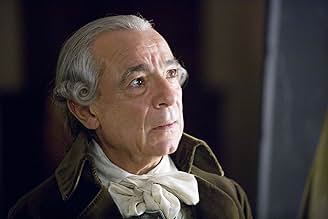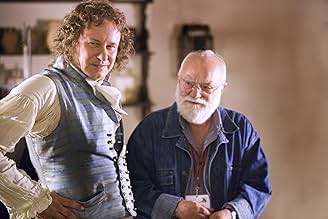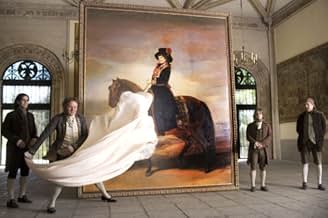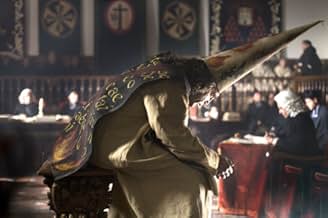NOTE IMDb
6,9/10
33 k
MA NOTE
Le peintre Francisco Goya se retrouve face à un scandale impliquant sa muse, qui est accusée d'hérésie par un moine.Le peintre Francisco Goya se retrouve face à un scandale impliquant sa muse, qui est accusée d'hérésie par un moine.Le peintre Francisco Goya se retrouve face à un scandale impliquant sa muse, qui est accusée d'hérésie par un moine.
- Réalisation
- Scénario
- Casting principal
- Récompenses
- 2 victoires et 5 nominations au total
Avis à la une
Imagine the paintings and drawings of Goya in all their darkness and beauty coming to life - this is Milos Forman's masterful film. Goya (and us)witness the folly of the Spanish royal court, the murderous sadistic perversion of the Catholic Church, the cruel inhumane madness of the Napoleonic War, along with the sensuality and beauty of life passing. This is the film's main focus: to let us experience the time and place as if seen through Francisco de Goya's eyes. As expected of a Milos Forman's film, the locales, the customs, and the overall production replicates the Spain of the late 18th century and early 19th century with the exactitude of a court painting. The cast is also excellent. As an Inquisitor turned a Napoleon's officer, Javier Bardem deserves another Oscar nomination. Stellan Skargsdar as usual does a chameleon-like transformation this time into Goya. Natalie Portman elevates herself into a higher realm of acting as the doomed, beautiful Ines. And Randy Quaid steals the screen for a few seconds as the King. Milos Forman again has given us an emotionally- and intellectually-challenging portrait of a dark era and the role of art and artist. Although some of the dramatization is slightly contrived, the film is compelling and moving and its vision lingers as Goya's art.
I saw it yesterday on film festival. And it was great.
When I was reading the description of the movie, I had some doubts. It seemed it would be yet another film about bad, intolerant catholics and good and democratic atheists. I'm just fed up with that kind of films. But it was not so. In a short - it's a great film with bad description.
What it really is about, is that it doesn't matter what principles one believes in if their life is doesn't match these principles. Both inquisitors and French democrats were capable of same brutality - always, of course, in name of some noble idea - love, freedom, equality... It's not sentimental or pathetic and it doesn't try to tell you what is "the only truth". It simply says that its not principles and ideas that are bad - its people. Characters are very human, with many errors - but, at the same time, each of the characters, even "villains" have moments when you will like them. It is also because the film changes perspective several times, and those who were despots become victims.
Maybe its not the best Forman's film, but it is very good.
When I was reading the description of the movie, I had some doubts. It seemed it would be yet another film about bad, intolerant catholics and good and democratic atheists. I'm just fed up with that kind of films. But it was not so. In a short - it's a great film with bad description.
What it really is about, is that it doesn't matter what principles one believes in if their life is doesn't match these principles. Both inquisitors and French democrats were capable of same brutality - always, of course, in name of some noble idea - love, freedom, equality... It's not sentimental or pathetic and it doesn't try to tell you what is "the only truth". It simply says that its not principles and ideas that are bad - its people. Characters are very human, with many errors - but, at the same time, each of the characters, even "villains" have moments when you will like them. It is also because the film changes perspective several times, and those who were despots become victims.
Maybe its not the best Forman's film, but it is very good.
A film by Milos Forman is always an event. This will probably not remain as one of the best in his career, and was surrounded by a level of controversy, not the least among critics who received it very differently. Yet, it is certainly a film to watch.
The story actually does not have Goya (Stellan Skarsgård) in the center. It is rather the story of a corrupt morality policeman of the 18th century (Javier Bardem) imprisoning a young girl (Natalie Portman) on the unjust suspicion of practicing Judaism in secret. It is the story of a police state built on social injustice relying on pretended moral puritanism in order to save the system. This happens at the price of huge human suffering like the drama in the center of the story, and here is the painter as a witness, living the dilemma of becoming involved as a human or remaining a witness as an artist. We know what path Goya chose.
I was not unhappy neither with the acting, nor with the story line, although it is a little bit too melo-dramatic and too much prone to coincidences. Forman is not so much focused on the drama or better say melo-drama, or even in the historical detail, although he seems to be on familiar ground getting back to the period in 'Amadeus'. What he is busy with seems to be more re-creating some of Goya's paintings and prints and tracing back the origin of inspiration of these masterpieces. In a way the film can be read as justification of the choice Goya made in life.
The story actually does not have Goya (Stellan Skarsgård) in the center. It is rather the story of a corrupt morality policeman of the 18th century (Javier Bardem) imprisoning a young girl (Natalie Portman) on the unjust suspicion of practicing Judaism in secret. It is the story of a police state built on social injustice relying on pretended moral puritanism in order to save the system. This happens at the price of huge human suffering like the drama in the center of the story, and here is the painter as a witness, living the dilemma of becoming involved as a human or remaining a witness as an artist. We know what path Goya chose.
I was not unhappy neither with the acting, nor with the story line, although it is a little bit too melo-dramatic and too much prone to coincidences. Forman is not so much focused on the drama or better say melo-drama, or even in the historical detail, although he seems to be on familiar ground getting back to the period in 'Amadeus'. What he is busy with seems to be more re-creating some of Goya's paintings and prints and tracing back the origin of inspiration of these masterpieces. In a way the film can be read as justification of the choice Goya made in life.
The acting and production values are of the highest order in "Goya's Ghost". Because I don't get around much anymore, I had not seen Ms Portman in a movie until "Ghost", and was very impressed, for like all the roles in this movie, her's was challenging. Javier Bardem is tough to equal in any movie, and as the 'heavy', (another heavy?!) he is outstanding; Stellan Skarsgård has come a long, long ways since "The Ox", and he has had a mixture of roles, some of them pretty thankless. As Goya, he does very well--a great actor. Natalie Portman--as I was a first timer regards seeing her work, I was bowled over--her role requires a terrible transformation, and makeup only goes so far, acting must be the key ingredient. So, along with the outstanding set designs and production values, Forman created another outstanding period piece. By the way, the actress Blanca Portillo who does the Spanish queen has a key small part--and you'll know her best scene when you see it! The story? It is about a wretched time and wretched people in a position of trust who violate that and prey on whomever they can. I think "Ghost" might not be for those who are not really into period pieces, but I am!
There is one great flaw here that almost everyone mentions... and it's true. The accents of the non-Spanish actors clash terribly with the Spanish ones, as well as with each other. That's a real flaw, but if you can get past that, there's a great film waiting to be seen. I found I forgot all about it after the first 10 minutes. The critics just don't get this film. A lot of regular people seem to miss it too. They want a film with a typical "leading" role. They want their morality tales (which this certainly IS) delivered in easy shades of Black and White... no gray. They don't understand films where the title character is primarily an Observer. Sometimes that CAN be dissatisfying, but here the Observer is a genuine genius. Some people want him to be a moral giant, but he's not, he's simply an observer who has actualized the doctor's oath: First, do no harm. This is a brilliant story, and a morally complex one, too. There are some parallels to America in Iraq, though that is not the primary goal. This story illuminates the folly of any regime, liberal or conservative, as each picks its friends and foes, taking 180 degree turns from whoever was last in power. Javier Bardem gives an incredibly canny performance! Natalie Portman is totally unsentimental and totally committed to her multiple roles: just great! Stellan Skarsgard threw me off at first with the sound of his voice, but builds a performance of power and truth, in spite of it. Randy Quaid was a small revelation. And of course the film looks and sounds spectacular, with it's numerous and detailed textures, compositions and sounds. If you want to think; if you like having pat assumptions challenged; if you love people and history and art: see it!
Le saviez-vous
- AnecdotesWhen asked why a film about such a quintessentially Spanish artist was made in English, the director replied "I don't speak Spanish."
- GaffesWhen Goya unveils the unflattering portrait of the queen, she is deeply offended. Actually, queen Maria Louisa liked that portrait so much that she made Goya the first court painter.
- Citations
[Bonaparte and Lorenzo are looking at paintings of Maria Luisa]
Joseph Bonaparte: I met her once... don't recall her being quite so ugly though. How did she have so many lovers?
Brother Lorenzo: [smiling] She was the Queen, Your Majesty.
Meilleurs choix
Connectez-vous pour évaluer et suivre la liste de favoris afin de recevoir des recommandations personnalisées
- How long is Goya's Ghosts?Alimenté par Alexa
Détails
Box-office
- Budget
- 50 000 000 $US (estimé)
- Montant brut aux États-Unis et au Canada
- 1 000 626 $US
- Week-end de sortie aux États-Unis et au Canada
- 159 671 $US
- 22 juil. 2007
- Montant brut mondial
- 9 448 082 $US
- Durée
- 1h 53min(113 min)
- Couleur
- Mixage
- Rapport de forme
- 1.85 : 1
Contribuer à cette page
Suggérer une modification ou ajouter du contenu manquant

































